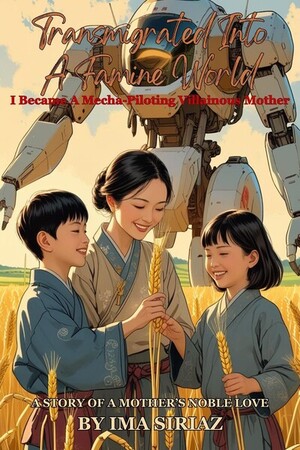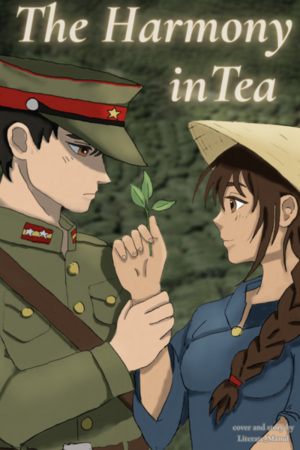Chapter 9:
Chapter 9: An Old Man's Grief
Transmigrated Into A Famine World, I Became A Mecha-piloting Villainous Mother
The first light of dawn had not yet broken over the horizon when the villagers gathered in the square. The air was heavy and still, dry as old parchment, the kind of silence that made every shuffle of feet and groan of wood echo louder than it should have. Once upon a time, mornings in this valley were painted in mist, a gentle shroud that clung to the thatched roofs and made the village seem like an illusion from a wandering bard’s tale. Children had once chased each other through the fog, laughing as they pretended to vanish like ghosts.
But there had been no morning mist since the start of last winter. The mountains no longer gave birth to clouds that drifted into the valley. The streams that once fed the fields had thinned to trickles, then to dust.
The absence of mist was not merely weather, it was a prophecy. The drought was not lifting anytime soon. Though no one dared say it aloud, every villager feared it would not lift in their lifetimes. A lifetime that would likely be short. Very short.
One by one, families arrived with what little they had left. Most pulled handcarts creaking under the weight of bundles wrapped in faded cloth, the remains of what was left of their belongings. Their loads were not much, just scraps of food, bladders of water, and fraying clothes patched too many times.
A few, those with the coins to spare, had managed to buy ox carts at the last moment. The beasts themselves were pitiable. Their ribs were showing, their tongues lolling from thirst. Their wide, mournful eyes mirrored the hopelessness of their masters. It was doubtful that they would survive the journey. But that didn’t matter, this was all their masters could afford.
The poorest carried their belongings on their backs. Nothing more than a sack slung over the shoulder, or a cloth bundle tied to a stick. And the contents were nothing valuable. No gold, silver or coins. Simply what was left of their preserved food or clothes that were breaking apart from being worn too many times.
Aina and her children stood apart. They were not part of this exodus, and they were not welcomed in it. Yet she could not help but watch. Even now, she strained to catch scraps of conversation, hints of where the others would go, how they planned to survive.
But no one spoke to her. Not a single person looked at her. Fear and hate intertwined, making even looking at her gave them intense displeasure. She had to rely instead on second-hand words, whispered over fences or carried to her ears by one of the few souls who still dared speak near her.
So she had to rely on third-party information. Someone who didn’t look at her with hate or fear. That third-party information was surprisingly, Old Man Jine.
In the past, Rinia Virell, whose body Aina now inhabited, had quarreled with him endlessly. Their farms bordered each other, and she was known to steal from his crops come harvest time. Though that wasn’t the only reason they had quarrelled.
Their last fight had been shortly before her death. Jine had stumbled upon her beating her children up in the yard, their hoarse cries cutting through the afternoon air. Normally, he would not have meddled in another family’s affairs, but that day he nearly rallied the whole village to cast her out.
He would have, if he did not notice what she was holding in her hand. It was a length of sage’s penance, a flowering vine with poison that amplified pain without drawing blood. A cruel tool, yes, but technically, a harmless one. He had seen her wield a heavier cane before, one that could flay skin and separate flesh. The same cane she had used once to drive off a wastrel who had tried to violate her daughter-in-law’s honour. So he knew she could’ve done worse and was puzzled that she didn’t try.
That was Rinia Virell. Brutal one moment, fiercely protective the next. She would torment her own children at the slightest infractions, yet launch herself into battle if anyone else dared to do the same. In his mind, Rinia Virell was a contradiction, a contradiction that he didn’t really know how to deal with.. Even to this day, he still did not know how to judge her beyond what he saw before his eyes at the moment.
The contradiction was even bigger when she died and crawled her way out of Hell.
He had mourned her death, truly, honestly mourned for her. Despite her cruelty, he saw in her something of the past, a sharp-tongued insufferable stubbornness that reminded him of someone he had once loved and lost. She wouldn’t listen to anything he had said either, only willing to concede when his wife intervened.
When Rinia’s death was announced in the village, his wife wept as if an old wound was violently ripped open. She too remembered another woman from long ago. A woman who was headstrong, unbearable, unforgettable. One who had left the world by tying a rope to the beam of their house, cursing the world for there being no place for a woman like her.
When Rinia hanged herself, Jine felt like a knife twisting in his chest. It was a regret that tied to the past. And when she came back crawling out from her grave, his heart had clenched with confusion.
Both he and his wife had mixed feelings. Without realizing it, they had imposed that one’s image onto Rinia. They felt that when Rinia returned to life, that one had too. But, Rinia’s return meant her children would continue to suffer.
So Old Man Jine watched her carefully since her return. He spied into her home day after day, waiting for the old cruelty to resurface. Waiting for the sound of her children’s cries. But the sound never came. Instead, he saw something he never expected.
She had changed.
No beatings, no curses, no cane striking flesh. Instead, he saw her going up to the second mountain with her children, gathering herbs, roots, anything edible. He saw them dragging back odd bundles of timber and vines.
He watched as she built something strange, a contraption that took shape piece by piece under her direction. The old Rinia Virell had never been a woman of invention or intellect. How could the revived one be so different?
He did not understand one bit.
When Old Man Jine told her that the villagers would head to the county town first to buy food, she surprised him by asking if she could tag along to buy food at the town. The request made him pause. He didn’t know what to tell her.
He understood her logic. After all, traveling with a large group meant safety, bandits wouldn’t dare target a large group. But he also knew what the others thought of her. It wouldn’t matter if it’s him who vouched for her, the hatred ran too deep. Even with his words, getting the villagers to agree would be extremely difficult.
He spoke to the village chief anyway, half out of duty, half out of curiosity. The chief listened, frowning, then shook his head.
“The villagers won’t let her come along,” he said. “But her children… her children are different. The villagers pity them. They will not turn the children away.”
When Jine delivered this answer, Aina’s face fell. She had hoped to see the county town herself, to glimpse the heart of this world beyond the narrow valley. But she accepted it quickly, with the quiet pragmatism that had defined her second life. “As long as someone can bring food back,” she said, “I won’t complain.”
Thankfully, she had done some woodturning lately and managed to make many wooden bowls and pots using the same woodturning lathe originally made to shave the wooden bearings and wheels for her scooter. As the lathe was already there, she didn’t want to waste the machine she already built.
When she crafted the first crude bowl from timber, she felt a spark. The focus, sense of purpose, the same drive that once had her debugging code until dawn or perfecting a machine part to within a hair’s breadth. Day after day, she sat at the crude lathe she had rigged, spinning wood into shape. Bowl after bowl, pot after pot, plate after plate. Each completed one making her more skilled, like levelling up in RPG games.
The children didn’t just watch, they lacquered the wares clumsily with tree resin when the sun was nearly setting. Their leaf brushes sticky with sap, their laughter rare but precious. What had begun as an attempt at replacement soon turned into a pile, then a mountain.
She simply did not stop. And her children did not bother her, except for asking her to come eat. Even so, they often had to shake her body before she would even acknowledge them.
Now her courtyard was stacked with neat rows of gleaming wooden ware, each one polished to a dull shine. Looking at them, Aina felt a flicker of embarrassment. She had lost herself again in repetition, in precise work that dulled the hunger and worry. Her coworkers in her old life had called her a machine, or a robot. Perhaps they were right.
Woodturning a bowl, a plate or a pot was repetitive, precise work. It was a work that robots could easily do, given the correct programming. And any work that robots could do, Aina could do better. As a result, she forgot the time and made too many.
She quickly had her children load the lacquered wares onto the scooter before securing them with additional vine ropes. At dawn, the villagers began their slow, mournful march out of the square. Two of her sons, the serious-faced Irek and the sturdy Varn, followed them, guiding the scooter behind the departing carts.
They were not part of the exodus. They were merely shadows trailing the crowd, hanging on to the group for safety. Their task was simply to reach the county town, sell their mother’s work, and return with food.
As Aina watched them go, her heart pulled tight in her chest. She stood in front of the front gate of her home. Her younger children stood close to her sides, and slowly she felt the silence and the isolation deepen around her. The square emptied, the creak of carts and shuffle of feet fading into the distance of the road westward, until the village was once more still.




Please sign in to leave a comment.